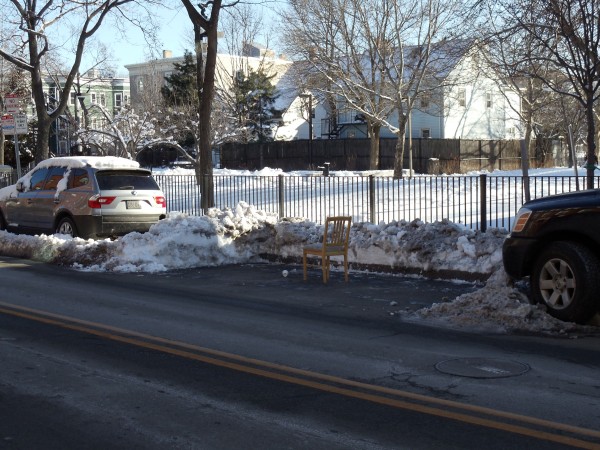Can you own something without a government enforcing that ownership right? Sometimes, yes:
Some time ago I read about Boston’s system for allocating parking spaces in snowy weather: you clear it, you claim it. (See also more recent articles, too.) I happened to see this system in action yesterday for the first time. People not living in areas with proper winter climes might not have heard of this before, and I think it’s a nifty little system worth highlighting. It calibrates investments and incentives, thus “pricing” a scarcity to produce a more efficient allocation. It saves money, because there’s no need to pay city workers to clear spaces. And it does so with little administrative overhead: individuals overwhelmingly maintain the system. It’s a thing of beauty all around.
For more on the economics of this property system, see the article Snow Jobs at the Library of Economics and Liberty.

Ah, been there done that. Wouldn’t change a thing.
Clever areas leave this emergent and self-sustaining system just as it is. It does save money and does brings communities together for mutual benefit. Where I have lived, neighbors defend each others’ hard-won parking spaces, thus forming a de facto government of a sort. I am not arguing against your assertion — this is not Government as we normally define it — but the system is often governed and enforced during really bad snows.
Sadly, I feel enshrining such a sensible system into Law would kill off voluntary enforcement, because we would all just call the police when someone “steals” our spaces.
Comment by J. McNair — 18.01.11 @ 09:03
I’d say that property rights presuppose legal enforcement of property rights. But that legal enforcement need not be a defined government (monopoly of force over a geographical region) but rather could be organized in other methods.
Still, nice to see a method of claiming parking spots. Uses an extremely Lockean form of transforming the land to gain first right to the parking spot, even if the property right dissipates as the snow does, and reappears also with the snow. First time I’ve seen what I see as legitimate property rights occur in such a temporary manner.
Comment by Havvy — 18.01.11 @ 23:24
Property rights only truly need to exist when people stop respecting ownership, when the right must be asserted. At that point they require enforcement, but it need not specifically be legal enforcement, by law. In cities with a shovel-it, own-it system, the enforcement mechanism does not rely on laws and their enforcement to function. It’s just the tire slash or the mirror smash, assuming it degenerates that far and that the people in question can’t reach some other rapprochement. (I don’t know how often conflicts descend that far in practice in these systems.) I’m making a somewhat subtle point: property rights require enforcement, but enforcement doesn’t always require law and a police system of some sort.
I will concede that the vigilante enforcement mechanisms sometimes found in this system are not ideal. Nor are they even legal, for that matter! But every legal system tolerates a little misbehavior at the edges, sometimes because strict enforcement just isn’t worth it (slight speeding), sometimes because the effort to prohibit it is too expensive (police can’t be everywhere all the time), but also sometimes because enforcement is an even greater wrong (as might sometimes be the case here, in those places that unofficially use the you-shovel-it-you-get-it system).
Comment by Jeff — 19.01.11 @ 07:44